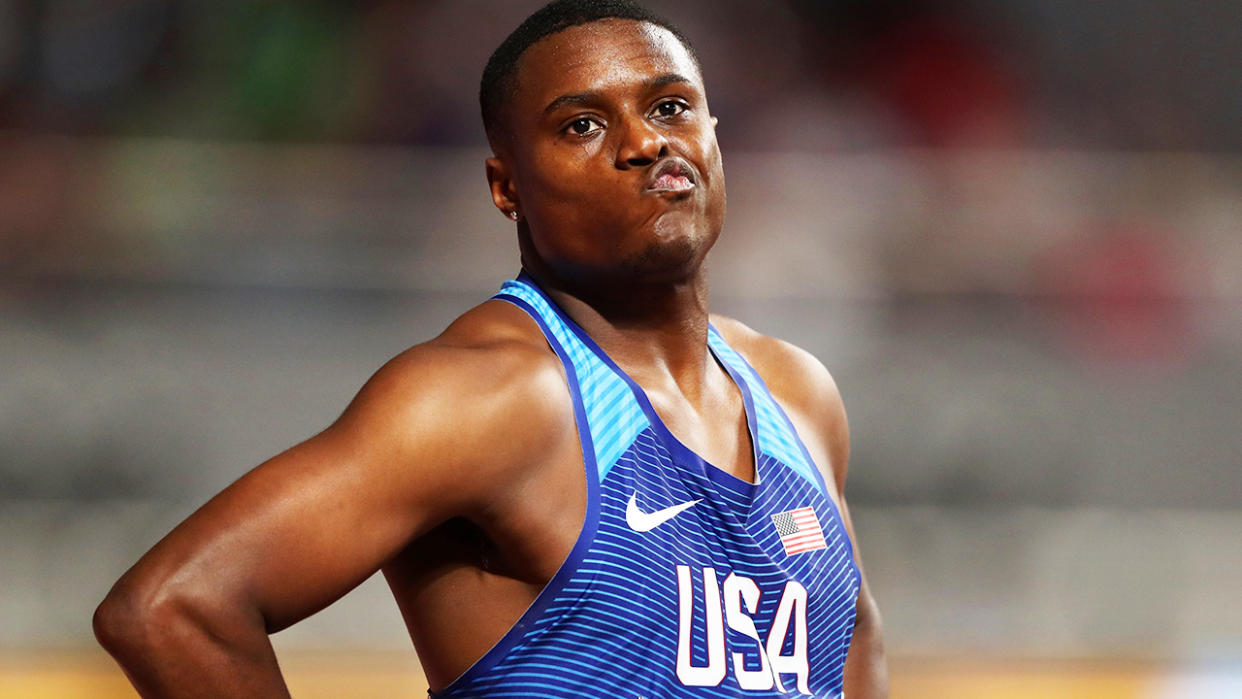'Simply impossible': Receipts behind Christian Coleman's doping ban

Christian Coleman’s excuse for missing multiple drug tests fell apart when receipts showed it was “simply impossible” for him to be telling the truth.
The world 100m champion will miss next year's Tokyo Olympics after being banned for two years for breaching whereabouts rules.
‘UTTER DISGRACE’: America erupts over 'disgusting' scenes
‘NEEDS HELP’: Shane Warne's fury over 'appalling' wife slur
Coleman, who narrowly escaped a ban last year for missing three doping tests, was provisionally suspended by the Athletics Integrity Unit in June.
“We regret to say that we do not think there is any mitigation which can fairly be relied upon to reduce the sanction from the two-year period,” the AIU said in a statement on its website.
“Unfortunately, we see this case as involving behaviour by the athlete as very careless at best and reckless at worst.”
The American sprinter claimed at the time of his provisional suspension that anti-doping officials had not followed procedure when he missed them after going Christmas shopping on December 9, 2019 at a time when he had said he would be at home.
But it has since emerged that the tribunal that decided his fate relied on a number of Coleman’s receipts from the night in question to show he wasn’t at home at all.
Doping control officers testified before a disciplinary tribunal that they were present during the whole of the allotted hour of 7.15pm to 8.15pm on December 9 in front of his house.
Coleman in turn testified he had arrived home from Christmas shopping shortly before the end of the one-hour period.
However, shopping receipts showed that Coleman had purchased 16 items from a Walmart Supercentre at 8.22 pm, the AIU said.
“Shopping receipts show that the athlete was shopping at least from 7.13pm, also purchased a chipotle at 7.53pm and finally purchased 16 items from a Walmart Super Centre at 8.22pm,” the tribunal said.
“The athlete’s evidence was that he returned home briefly some time between 8 and 8.10pm, ate his chipotle while watching the kick-off (of a football game) and then went out again.
“We do not accept the athlete’s evidence.
“It would have been simply impossible for him to purchase a chipotle at 7:53pm (the store being five to nine minutes to his residence), drive home, park the car, go into his residence, eat the chipotle, then watch the kick-off of the football game which only started at 8:15pm, and thereafter go out again in his car, drive to the store and pick up 16 items at the Walmart Supercentre so as to be able to pay for them by 8:22pm.”

Integrity Unit smacks down Coleman’s complaint
At the time of his provisional suspension, Coleman had complained that the AIU’s doping control officers had not called him on that night on December 9.
The AIU said in its judgement that doping control officers were not required to phone athletes.
The AIU said Coleman's ban would end on May 13, 2022 and that he could appeal the tribunal’s decision to the Court of Arbitration for Sport.
Three failures to properly file whereabouts information or being absent during the hour stated in a 12-month period can result in a one- or two-year suspension.
Coleman, also a silver medallist in the 100m and 4x100m relay at the 2017 worlds, escaped suspension last year when the US Anti-Doping Agency, after receiving guidance from the World Anti-Doping Agency on how to calculate the 12-month window for three missed tests, withdrew the charge.
The sprinter, who also helped the United States to 4x100m gold at the 2019 worlds in Doha, later demanded an apology from USADA, but two of those misses have now combined with the latest failure to result in a ban.
“The fact is that he had had the narrowest possible escape from a potential ban on this prior occasion,” the AIU said.
“It might be thought he would have learned from this experience... in fact, that is not at all what happened.”
with AAP
Click here to sign up to our newsletter for all the latest and breaking stories from Australia and around the world.


